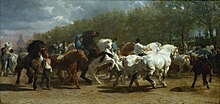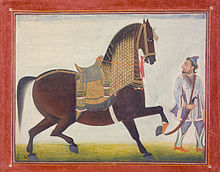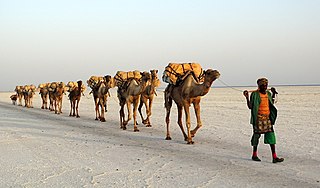
A camel train, caravan, or camel string is a series of camels carrying passengers and goods on a regular or semi-regular service between points. Despite rarely travelling faster than human walking speed, for centuries camels' ability to withstand harsh conditions made them ideal for communication and trade in the desert areas of North Africa and the Arabian Peninsula. Camel trains were also used sparingly elsewhere around the globe. Since the early 20th century they have been largely replaced by motorized vehicles or air traffic.

Chinese tea culture includes all facets of tea found in Chinese culture throughout history. Physically, it consists of tea cultivation, brewing, serving, consumption, arts, and ceremonial aspects. Tea culture is an integral part of traditional Chinese material culture and spiritual culture. Tea culture emerged in the Tang dynasty, and flourished in the succeeding eras as a major cultural practice and as a major export good.

Ma'anshan, also colloquially written as Maanshan, is a prefecture-level city in the eastern part of Anhui province in Eastern China. An industrial city stretching across the Yangtze River, Ma'anshan borders Hefei to the west, Wuhu to the southwest, and Nanjing to the east. It is a satellite city in the Nanjing metropolitan area and is also a city in the Yangtze River Delta Economic Zone.

Ma Zhiyuan, courtesy name Dongli, Chinese dramatist, playwright, and poet during the Yuan dynasty.
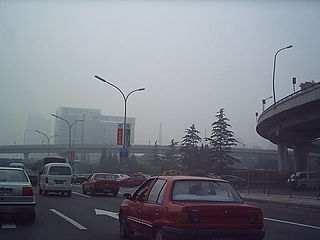
Madian is a community in Haidian District, Beijing, China. It is adjacent to the intersection of the 3rd Ring Road and the Jingzang Expressway, at the Haidian District-Xicheng District border. Two separate subdistrict offices serve portions of Madian.

The Tea Horse Road or Chamadao, now generally referred to as the Ancient Tea Horse Road or Chamagudao was a network of caravan paths winding through the mountains of Sichuan, Yunnan and Tibet in Southwest China. This was also a tea trade route. It is also sometimes referred to as the "Southern Silk Road" or "Southwest Silk Road."
Milk tea refers to several forms of beverage found in many cultures, consisting of some combination of tea and milk. The term milk tea is used for both hot and cold drinks that can be combined with various kinds of milks and a variety of spices. This is a popular way to serve tea in many countries, and is the default type of tea in many South Asian countries. Beverages vary based on the amount of each of these key ingredients, the method of preparation, and the inclusion of other ingredients Milk tea is the default type of tea in India and Pakistan and referred to as chai.

The Ovimbundu, also known as the Southern Mbundu, are a Bantu ethnic group who live on the Bié Plateau of central Angola and in the coastal strip west of these highlands. As the largest ethnic group in Angola, they make up 38 percent of the country's population. Overwhelmingly the Ovimbundu follow Christianity, mainly the Igreja Evangélica Congregacional de Angola (IECA), founded by American missionaries, and the Catholic Church. However, some still retain beliefs and practices from African traditional religions.

Compressed tea, called tea bricks, tea cakes or tea lumps, and tea nuggets according to the shape and size, are blocks of whole or finely ground black tea, green tea, or post-fermented tea leaves that have been packed in molds and pressed into block form. This was the most commonly produced and used form of tea in ancient China prior to the Ming Dynasty. Although tea bricks are less commonly produced in modern times, many post-fermented teas, such as pu-erh, are still commonly found in bricks, discs, and other pressed forms. Tea bricks can be made into beverages like tea or eaten as food, and were also used in the past as a form of currency.
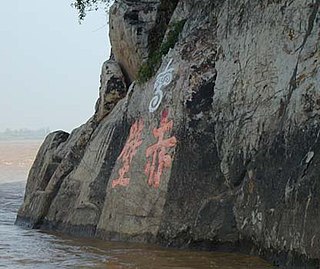
Chibi is a county-level city in southeastern Hubei province, China. Neighboring Wuhan in the north and Yueyang in the south, Chibi is called the "South Gate of Hubei". It is under the administration of Xianning prefecture-level city. Chibi was called Puqi until 11 June 1998, when the State Council approved its renaming to "Chibi" since it was alleged as the site of the famous Battle of Chibi that took place in the winter of 208/9 CE.
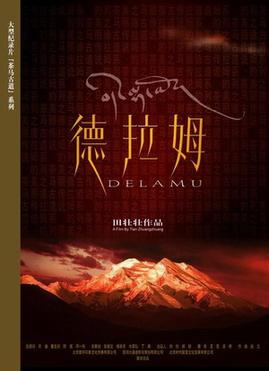
Delamu is a 2004 documentary film directed by Fifth Generation Chinese filmmaker, Tian Zhuangzhuang. Delamu documents the people living in the Nujiang River Valley, along the Tea Horse Road, an ancient trade route between China's Yunnan province and Tibet. The film was jointly produced by companies in the People's Republic of China, and Japan. It had its American premier at the 2004 Tribeca Film Festival.
Cawarong or Tsawarong is a township in Zayü County, Tibet Autonomous Region of China. It lies at an altitude of 2,003 metres. Formerly known as Tsarung, it was traditionally a southern gateway and trade route into Tibet from Yunnan, forming part of the tea-horse road. It is a very arid area with little rainfall. An unsealed road cut into the cliffs above the Nu River links it to Bingzhongluo in Yunnan. Cawarong is a major step on the Khora of the Khawa Karpo.

Dayan, commonly called the Old Town of Lijiang is the historical center of Lijiang City, in Yunnan, China. It is a UNESCO World Heritage Site.
Gyêgu Subdistrict, formerly a part of the Gyêgu or Jiegu town is a township-level division in Yushu, Yushu TAP, Qinghai, China. The name Gyêgu is still a common name for the Yushu city proper, which include Gyêgu subdistrict and three other subdistricts evolved from the former Gyêgu town. The four subdistricts altogether forms a modern town which developed from the old Tibetan trade mart called Jyekundo or Gyêgumdo in Tibetan and most Western sources. The town is also referred to as Yushu, synonymous with the prefecture of Yushu and the city of Yushu.
The Sanju, or Sanju-la, with an elevation of 5,364 metres (17,598 ft), is a historical mountain pass in the Kun Lun Mountains in Pishan County, Hotan Prefecture, Xinjiang, China. During ancient times, it was the last on a series of difficult passes on the most common summer caravan route between Ladakh and the Tarim Basin. In recent years, besides being used by the locals, it has also become a trekking route for Chinese trekkers. In early 2020s, a scenic unpaved auto tour route was opened along the trail for road trippers.

Matcha (抹茶) is a finely ground powder of specially grown and processed green tea leaves that originated in China. Later, the green color exhibited in most modern matcha was developed in Japan, where most matcha is produced today. In the 12th century at the latest, Chinese compressed tea, the raw material for matcha, was introduced to Japan. When the production of compressed tea was banned in China in 1391, matcha was abandoned in China but continued to develop in Japan thereafter.
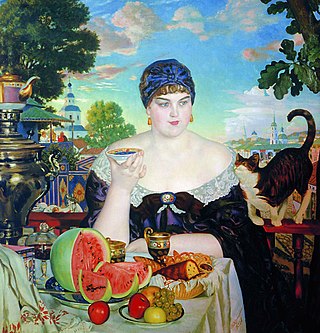
Tea is an important part of Russian culture. Due in part to Russia's cold northern climate, it is today considered the de facto national beverage, one of the most popular beverages in the country, and is closely associated with traditional Russian culture. Russian tea is brewed and can be served sweet, and hot or cold. It is traditionally taken at afternoon tea, but has since spread as an all day drink, especially at the end of meals, served with dessert. A notable aspect of Russian tea culture is the samovar, which was widely used to boil water for brewing until the middle of the 20th century.
The Single whip law or the "Single whip reform" was a fiscal law first instituted during the middle Ming dynasty, in the early 16th century, and then promulgated throughout the empire in 1580 by Zhang Juzheng.

The etymology of the various Chinese words for the English word tea reflects the history of transmission of tea drinking culture and trade from China to countries around the world. In this context, tea generally refers to the plant Camellia sinensis and/or the aromatic beverage prepared by pouring hot boiling water over the leaves. Nearly all of the words for tea worldwide fall into three broad groups: te, cha and chai, present in English as tea, cha or char, and chai. The earliest of the three to enter English is cha, which came in the 1590s via the Portuguese, who traded in Macao and picked up the Cantonese pronunciation of the word. The more common tea form arrived in the 17th century via the Dutch, who acquired it either indirectly from the Malay teh, or directly from the tê pronunciation in Min Chinese. The third form chai originated from a northern Chinese pronunciation of cha, which travelled overland to Central Asia and Persia where it picked up a Persian ending yi, and entered English via Hindustani in the 20th century.
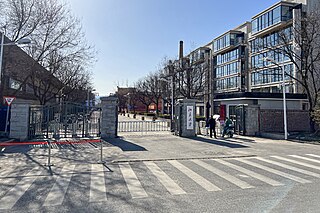
Machikou Area is an area and a town inside of Changping District, Beijing, China. Machikou shares border with Chengnan and Chengbei Subdistricts to its north, Nanshao and Shahe Towns to its east, Shangzhuang and Yangfang Towns to its south, and Nankou Town to its west and north. The population for this area was 87,506 as of 2020.
